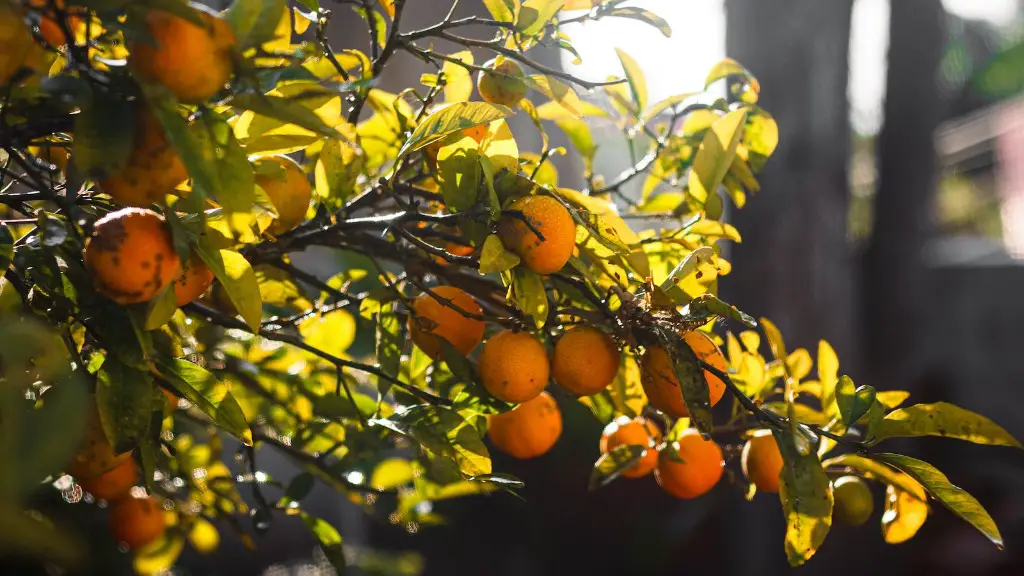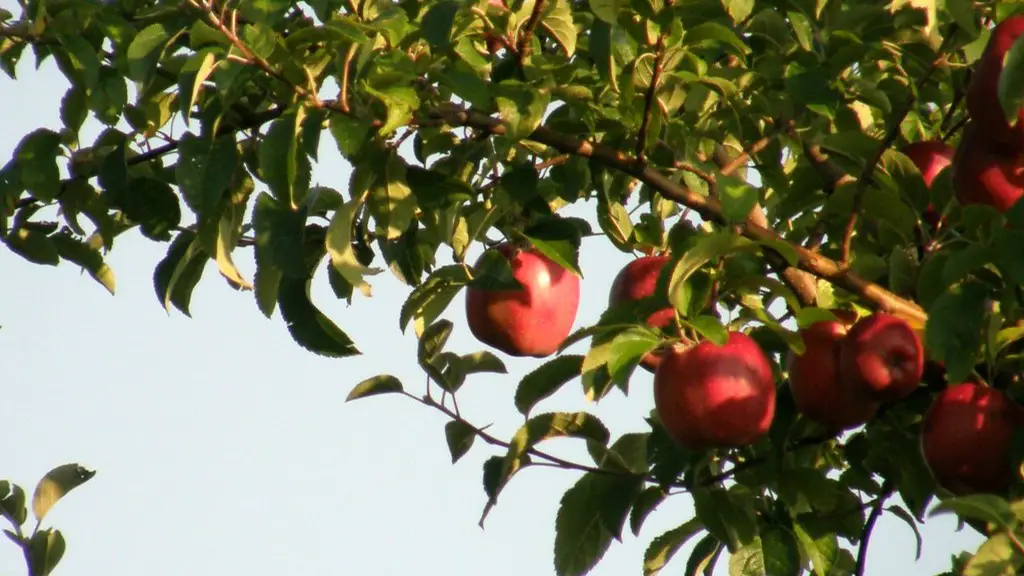Lemon trees are beautiful evergreen trees that can provide a home with a bounty of juicy lemons. But sometimes the leaves of a lemon tree can start to turn yellow and that can be a cause for concern. So why do lemon tree leaves go yellow? It can be caused by a few things.
A major cause of yellowing of lemon tree leaves is stress from lack of water or fertilizer. If you haven’t properly maintained your lemon tree, it could be short on either one of these and the lack of these essential elements can cause the leaves to turn yellow. You can help your tree by giving it a good soak and providing it with a generous amount of fertilizer. This should help the leaves return to their normal healthy colour.
Incorrect use of pesticides can also cause yellowing of lemon tree leaves. If you’ve been applying pesticide more than necessary or if you’ve been misusing it, it can put stress on the tree and cause the lemon leaves to turn yellow. To help improve the condition of your tree, make sure you use pesticides as directed and only when needed.
One other cause of yellowing lemon leaves is when the tree has an infection or disease. If your tree has been infected with a fungal infection like powdery mildew or citrus black spot, it can cause the leaves to become yellow. To help improve the condition of your tree, make sure you follow proper pruning and spraying techniques, use fungicides to reduce the spread of the disease, and make sure your tree is regularly watered and fertilized.
These are the main reasons why lemon tree leaves go yellow. Sometimes it can be due to natural stress or environmental changes, but generally it is something that can be avoided with proper care of the tree. Make sure you’re providing your tree with the right amount of water and fertilizer, and that you’re using pesticides correctly. If you do all of this, your tree should remain healthy and its leaves should stay green.
Pests Affect Lemon Tree Leaves
Pests are another reason why lemon tree leaves can go yellow. Certain pests like citrus mites, aphids, and whiteflies can cause the leaves of your lemon tree to become yellow. These tiny pests can suck the sap out of the leaves, leaving them discolored or yellow. You can help reduce the impact of pests by regularly spraying your tree with insecticidal soap or pesticide. This will help keep the pests away and can also help keep your tree looking and producing healthy.
When it comes to pests, it is best to take some preventive measures to help protect your tree. Make sure you check your tree regularly for signs of damage and get rid of the pests right away when you see them. You can also try using some natural deterrents like neem oil or diatomaceous earth which can help repel pests and can keep your lemon tree in good shape.
By taking the necessary steps to prevent pests, you can help ensure that your lemon tree stays healthy and that its leaves stay green. Make sure to regularly check for pests and use the right products to get rid of them.
Environmental Factors Can Affect Lemon Tree Leaves
Environmental factors can also cause your lemon tree leaves to go yellow. If your tree is planted in a spot that gets too much direct sunlight or in a location that’s too damp or humid, it can cause the leaves to become discolored and yellow. In order to keep your lemon tree healthy, make sure it’s not exposed to too much direct sunlight or too much dampness. Also make sure the soil that it’s planted in is not overly wet or dry.
Another environmental factor that can affect lemon tree leaves is high winds. If the winds are too strong, they can cause the leaves to become yellow as it can damage them. To help protect your tree from the wind, you can install some windbreaks or other structures that can shield it from the strong gusts.
Finally, extreme temperatures can also cause your lemon tree leaves to go yellow. If the temperature is too hot or too cold, it can cause the leaves to become discolored. To keep your lemon tree happy and healthy, make sure it’s in a spot that’s not too cold or too hot and that offers some degree of protection from extreme temperatures.
Diseases and Fungal Infections Can Affect Lemon Tree Leaves
Diseases and fungal infections can also cause your lemon tree leaves to go yellow. Certain diseases such as citrus canker and mellison can cause the leaves to become yellow, while fungal infections such as powdery mildew and citrus black spot can also discolor the leaves. In order to help keep your lemon tree healthy and its leaves green, make sure you follow proper pruning and spraying techniques, use fungicides to reduce the spread of the disease, and make sure it’s regularly watered and fertilized.
In addition to the diseases and fungal infections, there are other types of pests such as scale insects that can cause the leaves to become yellow. To help prevent the spread of these types of pests, make sure you check your tree regularly and take action as soon as you spot any signs of damage. Regular pruning, spraying, and use of natural deterrents such as neem oil can help to keep your tree healthy.
By taking the necessary steps to protect your lemon tree from diseases, pests, and environmental stressors, you can help ensure that your lemon tree remains healthy and that its leaves stay green. Make sure you provide your tree with the right amount of water and fertilizer, check regularly for pests, and use the right products to get rid of them.
Nutritional Deficiencies Affect Lemon Tree Leaves
Nutritional deficiencies can also cause your lemon tree leaves to go yellow. If your lemon tree is not receiving enough essential nutrients such as nitrogen, phosphorus, and potassium, it can lead to yellowing of the leaves. In order to prevent nutritional deficiencies, make sure you regularly fertilize your tree and provide it with the right minerals and trace elements.
Another way to ensure that your lemon tree is getting all of the nutrients it needs is to add organic matter such as compost or compost tea to the soil. Organic matter is full of essential nutrients that can help make sure your lemon tree is getting everything it needs. Applying a slow-release fertilizer is also another way to ensure that your lemon tree is receiving enough of the right nutrients.
When it comes to lemon tree health, proper nutrition is key. Make sure to regularly provide your tree with the right amount of fertilizer and nutrients and add some organic matter to the soil to help ensure that it gets all of the essential minerals it needs.
Proper Pruning Promotes Healthier Lemon Tree Leaves
Proper pruning is also very important for promoting healthy lemon tree leaves. Pruning your tree regularly helps to encourage growth and helps to keep it looking healthy. Pruning also helps to get rid of dead or diseased branches, and can help to improve the overall shape and structure of your tree.
When it comes to pruning your lemon tree, it is best to do it during the cooler months of the year. This is when the tree is dormant, meaning that it needs less energy and is more responsive to pruning. Also make sure to prune your tree in moderation, as too much pruning can have a negative effect.
It is also important to make sure you use the right tools when pruning your lemon tree. Avoid using dull or rusty tools, as these can cause damage to the tree. And make sure to use sharp and clean tools, as these will help to make sure your pruning is neat and effective.
By following the proper pruning techniques, you can help make sure your lemon tree stays healthy and its leaves stay green. Proper pruning can also help to keep the tree looking good and can even help to increase yields. Make sure to prune your tree regularly and use the right tools for the job.



